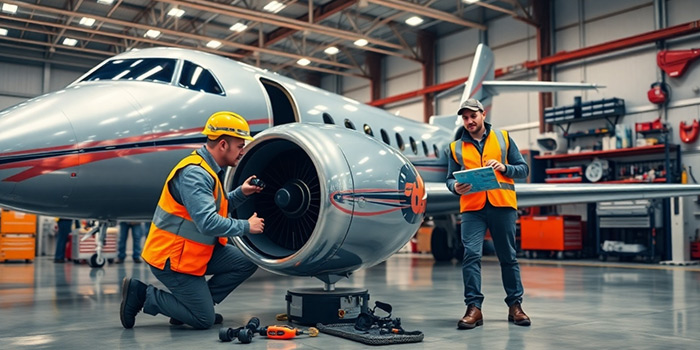The Importance of a Pre-Purchase Aircraft Inspection
20 Mar 2025
Highlights:
Acquiring an aircraft represents a significant financial commitment, often involving millions of dollars. The key to safeguarding this investment lies in a meticulous pre-purchase aircraft technical inspection (PPI).

The crucial step of a pre-purchase aircraft technical inspection ensures the aircraft meets safety, operational, and regulatory standards while providing buyers with valuable insights to make informed decisions. A thorough PPI involves two critical stages: a preliminary review and an in-depth technical evaluation.
The preliminary phase is a detective-like process where an inspector examines the aircraft’s condition and configuration against the buyer’s need. Maintenance history and operational usage are also carefully reviewed.
Subtle details, such as corrosion from severe environment exposure, or the wear pattern of fuselage and components, offer vital clues about the aircraft's condition.
This stage often occurs before a Letter of Intent is signed, empowering buyers with essential knowledge to negotiate terms or reassess their options.
If the findings are favorable, the inspection advances to a comprehensive evaluation. This includes, but is not limited to, in-depth physical assessment of the structure, cabin, components and systems, a detailed review of the technical records, as well as engine borescope examinations and demo flight.
Mitigating Risks and Maximizing Value
Safety is paramount in aviation. A PPI ensures the aircraft configuration is acceptable by the buyer, but it also validates the aircraft and maintenance records condition, ensuring they are complete and compliant with regulatory standards set by agencies like the FAA or EASA. Missing or improperly documented maintenance and repairs can jeopardize airworthiness, making this step non-negotiable.
A thorough physical inspection also uncovers hidden discrepancies that might not be apparent during a casual review, and that could compromise safety or require costly repairs.
Corrosion, fatigue cracks, or internal engine defects can lead to significant future expenses. Identifying these problems allows buyers to negotiate better terms, request repairs, or even reconsider the purchase.
Long-Term Benefits of a PPI
A PPI safeguards an aircraft’s resale value by addressing issues early and ensuring the aircraft remains compliant with delivery conditions. Buyers gain peace of mind knowing their investment is sound, safe, and reliable. Furthermore, the process ensures transparency, eliminating unpleasant surprises post-purchase.
AviaPro Consulting brings unparalleled expertise to every pre-purchase inspection. From uncovering hidden defects to navigating complex technical negotiations, our team ensures buyers receive maximum value from their investment.
Partner with us to make your aircraft acquisition a seamless and secure experience.
Author
Sajedah Rustom is the Chief Executive Officer of AviaPro Consulting, a global boutique aviation consultancy offering solutions in Aviation Strategy and Operations Consulting, Technical and Engineering Services, Training and Development, and Aviation Analytics and Technology Solutions.
This article is also featured in AvBuyer.
AviaPro Newsroom
+1 416-544-9969
info@aviaproconsulting.com

Editorial Contacts